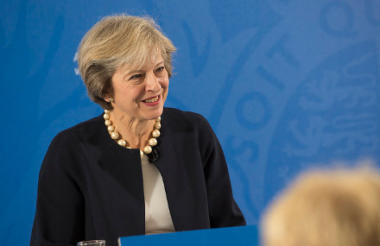When I became editor of Charity Finance in September 2015, I vowed not to bang on about politics in every leader column. However, I couldn’t have foreseen that we would end up holding two major public votes in two years with such far-reaching consequences, so here we are again speculating on what all this means for the charity sector.
The big news from the charity perspective is the departure of Rob Wilson as minister for civil society, who lost his seat in Reading East. He is unlikely to be missed – although NCVO has credited him for his work in establishing a new system of fundraising regulation, most observers have been disappointed with his excessive emphasis on social investment to the exclusion of other priorities. On an interpersonal level, he has also failed to display much warmth or charm in his dealings with the sector and those working within it.
Tracey Crouch has been appointed as his successor, and has already shown an apparently genuine enthusiasm for the civil society brief, which is a step in the right direction. She will be taking on the combined role of minister for sport and civil society, which may or may not mean a reduction in the amount of attention she can give to the charity sector. It also remains to be seen how much power she will have to make major changes in policy. But her appointment is nevertheless a promising development.
It’s good to talk
Thinking more broadly, what are the lessons from this election? After all, the result was a distinctly surprising one which has caused many of us to reassess how we view the government and the electorate at large.
One lesson that springs to mind comes from Theresa May’s failures of leadership. There has been much talk about the dominance that she and her two advisers held over decisionmaking – the planned amendments to social care, the lack of a positive vision in the Conservative manifesto and indeed the decision to hold a snap election in the first place may all have been prevented had the cabinet and wider stakeholders been consulted.
Charity leaders can equally benefit from a consultative approach. While there may be occasions when it is necessary to drive through unpopular decisions, most of the time, evidence gathering and consultation are a vital part of decision-making.
Planning for the new GDPR data protection legislation is a case in point. As Rowenna Fielding writes in this month's issue of Charity Finance, while ownership of data at the very top of the organisation is vital, so too is asking each department or team what they do, why and how, in order to leverage their understanding of the organisation’s processes and work out how data should fit into that picture.
Jez we can
Finally, it’s worth reflecting on Jeremy Corbyn’s Lazarus-like rise in the polls. His positive message of hope and transformation has resonated in a way that few anticipated, and this is surely something that the charity sector can take heart from. Whether or not you support his policies or trust in his competence, it is refreshing to see a politician prosper in this way, after several years of negative topics such as immigration and benefit cuts holding sway.
Positive stories are a resource that the charity sector has in abundance, and there was no better demonstration of this than last month’s Charity Awards. From overall winner the Clink Charity rehabilitating prisoners through restaurant work, to international aid and development winner Pump Aid fostering the creation of local small businesses to improve water supplies, these are the sort of activities that exemplify the value of the sector, and which ultimately sustain public trust.
Gareth Jones is editor of Charity Finance










